
|
Old Testament
New Testament
Gospels
Acts
Paul's Letters
General Letters
Revelation
Topical Studies
Beginning the Journey (for new Christians). en Español

|
Old Testament
New Testament
Gospels
Acts
Paul's Letters
General Letters
Revelation
Topical Studies

|
Home
Bible Studies
Articles
Books
Podcasts
Search
Menu
Donate
About Us
Contact Us
Sitemap
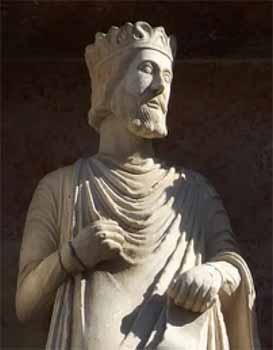 Benedetto Antelami (Romanesque sculptor, ca. 1150-1230), detail of ' King Solomon' marble statue, the Diocesan Museum, Duomo, Parma, Italy. Full sculpture. |
Solomon is known for a number of things -- the temple he built, his wealth, his splendor, but above all he is known for his wisdom. It is legendary.
In this lesson we'll examine how he acquires wisdom, the breadth of that wisdom, and how it shows up in Solomon's life. We'll conclude by considering our own God-given talents and our responsibility to serve him with them.
2.1 Solomon's Early Errors (1 Kings 3:1-3)
1 Kings 3 discusses Solomon's love for Yahweh, but begins with two sins that Solomon commits early in his reign that bear bitter fruit later in life.
- Taking as wife the daughter of Pharaoh (verse 1), and
- Sacrificing on the high places (verses 2-3.
Solomon isn't wise about everything.
Intermarriage with Unbelievers (1 Kings 3:1)
"1 Solomon made an alliance with Pharaoh king of Egypt and married his daughter. He brought her to the City of David until he finished building his palace and the temple of the Lord, and the wall around Jerusalem." (1 Kings 3:1)
Marrying the daughter of Pharaoh must have been viewed as a diplomatic coup that creates peace with Egypt, Israel's large and sometimes powerful neighbor to the south. (More on Pharaoh's daughter in Lesson 5.1.) Though marriage alliances might be viewed as politically expedient, marrying a spouse who is not a believer is specifically prohibited in Scripture.
"3 Do not intermarry with them. Do not give your daughters to their sons or take their daughters for your sons, 4 for they will turn your sons away from following me to serve other gods." (Deuteronomy 7:3-4a)
Solomon either ignores or rationalizes the command of God and marries an Egyptian princess in spite of it.38
High Places (1 Kings 3:2-3)
Solomon's second sin relates to something that may seem innocuous to us -- sacrificing at the high places.
"2 The people, however, were still sacrificing at the high places, because a temple had not yet been built for the Name of the Lord. 3 Solomon showed his love for the Lord by walking according to the statutes of his father David, except that he offered sacrifices and burned incense on the high places." (1 Kings 3:2-3)
"High places" are a holdover from Canaanite worship, where sacrifices were made to a Canaanite deity such as Baal or Asherah on the summits of either natural or artificial hills or mounds set aside for cultic purposes. In some cases, "high place" came to refer not to just the hilltop, but the entire cultic installation there of altars, Asherah poles, standing stones representing deities, etc.
Moses commanded the Israelites to remove remnants of Canaanite worship when they entered the Promised Land:
"Destroy all their carved images and their cast idols, and demolish all their high places." (Numbers 33:52)
The Book of Deuteronomy specifies:
"13 Be careful not to sacrifice your burnt offerings anywhere you please. 14 Offer them only at the place the Lord will choose in one of your tribes, and there observe everything I command you." (Deuteronomy 12:11, 13--14, 18; cf. Leviticus 17:5)
This command, however, seems to be widely disregarded, especially before the temple was built -- even by the Prophet Samuel.39
It is likely that high places were scattered throughout the land as in the case of Gideon's father's altar to Baal and Asherah in Ophrah (Judges 6:25-26) and Elijah on Mt. Carmel, who "repaired the altar of the Lord which was in ruins" (1 Kings 18:30).
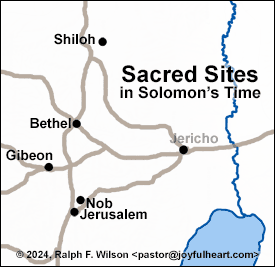 Sacred Sites in Solomon's Time. Larger map. |
High places continued to plague true worship of Yahweh for centuries (Psalm 78:58), since they were not under the control of the priesthood. Though sacrifices to Yahweh continued on the high places, sometimes sacrifices to false gods were made there too. The high places compete with the pure worship of Yahweh led by the priests at the tabernacle at Shiloh, and later, the temple Solomon builds.
Kings -- even good kings -- are hesitant to tear down these folk worship centers.40 The formulaic assessment of Solomon's allegiance to Yahweh here is paralleled by that of otherwise "good kings" of Judah, who "did not remove the high places."
- Asa (1 Kings 15:14)
- Jehoshaphat (1 Kings 22:43--44)
- Joash (2 Kings 12:2--3)
- Amaziah (2 Kings 14:3--4)
- Azariah (2 Kings 15:3-4)
- Jotham (2 Kings 15:34--35)
Finally, the cycle is broken with Hezekiah and Josiah.
Hezekiah. "He did what was right in the eyes of the Lord, just as his father David had done. He removed the high places, smashed the sacred stones and cut down the Asherah poles." (2 Kings 18:3-4a)
Josiah. "Josiah brought all the priests from the towns of Judah and desecrated the high places, from Geba to Beersheba, where the priests had burned incense." (2 Kings 23:8a)
The assessment that Solomon didn't destroy the high places may seem formulaic and excusable, since they were widely used even for Yahweh worship in his time. However, in this disobedience is found the seed of his later apostasy, when he builds pagan shrines on the high places east of Jerusalem for his wives to worship false gods (Lesson 6.1). If Solomon had rid the land of the high places as the Law commands, his successors would have likely followed suit. His disobedience sets the pattern for centuries.
The priests might have quoted the Scriptures -- "Do not intermarry with them...." (Deuteronomy 7:3) and "Demolish all their high places" (Numbers 33:52) -- but they would have done so very quietly for two reasons: (1) The culture had winked at these commands for hundreds of years; and (2) to criticize a king's behavior is extremely dangerous. Occasionally, a prophet will obey God and call a king to account, but not easily, not often.
You and I are just as susceptible to disobedience when our culture and our leaders no longer consider certain commands important. We can so easily fall into sin unless we remain students of the Word and let the Holy Spirit's conviction guide us.
Q5. (1 Kings 3:1-4) In what way does Solomon's marriage
to Pharaoh's daughter enhance his status in the Ancient Near East? How does this
marriage compromise him as a follower of Yahweh? How does his worship on the
high places -- and failure to destroy them -- damage the purity of Yahweh worship
for centuries to follow? In what areas do our compromises as parents and
pastors impact our own discipleship and the faith of our families and
congregations?
https://www.joyfulheart.com/forums/topic/2248-q5-compromise/
2.2 Solomon's Prayer for Wisdom, God's Answer (1 Kings 3:4-15)
Solomon Sacrifices at Gibeon (1 Kings 3:4)
As chapter 3 begins, we find Solomon at Gibeon, a city about 5 miles (8 km.) northwest of Jerusalem.41 The tabernacle and bronze altar constructed by Moses have been moved from Shiloh,42 which seems to have been violently destroyed43 during David's time.44 Then they seem to have resided in Nob for a time (1 Samuel 21-22)45 before removal to Gibeon. Here at Gibeon, the official priesthood offers sacrifices, though quasi-official sacrifices are also taking place in Jerusalem at an altar in front of the tent David had pitched to house the ark (2 Samuel 6:17-18).
Our text describes Solomon as a king who loves Yahweh.
"The king went to Gibeon to offer sacrifices, for that was the most important high place, and Solomon offered a thousand46 burnt offerings on that altar." (1 Kings 3:4)
Gibeon is no longer a high place prohibited to Yahweh-worshippers since the tabernacle now resides there. Solomon's sacrifices on this occasion are entirely proper.
Solomon's Dream at Gibeon (1 Kings 3:5-15; 2 Chronicles 1:7-12)
We often remember Solomon for his sins, but we must remember three things about Solomon at this stage of his life:
- He is loved by God ("Jedidiah," 2 Samuel 12:25),
- He loves God and seeks to keep the commandments, (1 Kings 3:3), and
- He exhibits a sincere desire to be a good king for his people (1 Kings 3:9).
At this point he is a devout follower of Yahweh.
God's Question to Solomon (1 Kings 3:5)
After sacrificing many animals, Solomon sleeps.
"At Gibeon the Lord appeared47 to Solomon during the night in a dream, and God said, 'Ask for whatever you want me to give you.'" (1 Kings 3:5)
God asks a question, a kind of riddle:
"Ask for whatever you want me to give you." (1 Kings 3:5b)
God has appointed him king. Now he invites Solomon to ask for whatever resources he feels he needs. It isn't an open-ended promise or blank check exactly, but a question -- and, as we'll see, a kind of test.
Solomon's Answer (1 Kings 3:6-9)
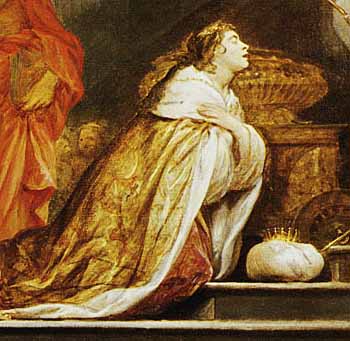 Govert Flinck, detail from 'Solomon Asks for Wisdom' (1658), oil on canvas, 450 x 465 cm, Amsterdam City Hall. |
First, Solomon acknowledges God's mercy to David.
"6 You have shown great kindness48 to your servant, my father David, because he was faithful to you and righteous and upright in heart. You have continued this great kindness to him and have given him a son to sit on his throne this very day." (1 Kings 3:6)
Solomon recognizes the huge responsibility and humbles himself before God.
"7 Now, O Lord my God, you have made your servant king in place of my father David. But I am only a little child and do not know how to carry out my duties.49 8 Your servant is here among the people you have chosen, a great people, too numerous to count or number." (1 Kings 3:7-8)
Solomon is young, but he is neither a little child nor stupid. This is hyperbole, words of abasement and humility before God.
"Give your servant a discerning heart to govern your people and to distinguish between right and wrong. For who is able to govern this great people of yours?" (1 Kings 3:9)
Now we read God's reaction.
"The Lord was pleased that Solomon had asked for this." (1 Kings 3:10)
How very rare is Solomon's heart! So often in leaders we find a desire for fame, a lust for power, a hunger for wealth. How rare -- and wonderful! Solomon wants to serve God's people as best he can. God is pleased.
Q6. (1 Kings 3:5-15) What does Solomon's answer to God's
question tell us about Solomon's heart at this time? Do you serve Jesus for
what he can do for you or for what you can do for him? Why is singleness of
heart so important to true discipleship?
https://www.joyfulheart.com/forums/topic/2249-q6-whole-heartedness/
God's Gift of Wisdom, Riches, and Honor (1 Kings 3:11-15a)
In this vivid dream, God responds to Solomon's earnest heart:
"11 Since you have asked for this and not for long life or wealth for yourself, nor have asked for the death of your enemies but for discernment in administering justice,50 12 I will do what you have asked. I will give you a wise and discerning heart, so that there will never have been anyone like you, nor will there ever be. 13 Moreover, I will give you what you have not asked for--both riches and honor -- so that in your lifetime you will have no equal among kings. 15 Then Solomon awoke -- and he realized it had been a dream. (1 Kings 3:11-15a)
|
Solomon does not ask for (vs. 11) |
God grants (vss. 12-14) |
Long life |
Long life if he obeys (vs. 14). He didn't, and so lived only 60 years.51 |
Wealth |
Riches (vs. 13) |
Death of his enemies |
|
Honor |
Honor among the nations (vs. 13) |
"He returned to Jerusalem, stood before the ark of the Lord's covenant and sacrificed burnt offerings and fellowship offerings. Then he gave a feast for all his court." (1 Kings 3:15)
The Blessing of Good Governance (1 Kings 3:9)
Before we leave this incident, let us consider why Solomon asks for wisdom.
"Give your servant a discerning heart to govern your people and to distinguish between right and wrong. For who is able to govern this great people of yours?" (1 Kings 3:9)
Solomon desires to be the source for good governance for God's people. He recognizes that the people are God's, not his. He is governing on God's behalf over God's people.
The term translated "govern" (NIV, ESV, NRSV), "judge" (KJV), used twice in verse 9, is shāpaṭ, "judge, govern," which can refer to the whole process of governing.52
To govern well, a king or prime minister or president needs to be wise -- wise enough to know which of his advisors is giving good advice and wise enough to act in a way that will solve problems, not create new ones.
As your government chooses leaders, look for character and wisdom, not charisma. As your church selects leaders, look for character and wisdom, since both will powerfully affect the quality of leadership that the leader is capable of.
2.3 Wisdom, Discernment, and Knowledge in Ancient Israel
Just what is involved with the wisdom Solomon receives? To learn this we need to look at the Hebrew words behind our translations of 1 Kings 3:12 and 2 Chronicles 1:12.
Wisdom (ḥākām). The Hebrew noun for "wisdom" is ḥākām, from the root ḥākam, "to be wise, act wise(ly)." The essential idea is a manner of thinking and attitude concerning life's experiences; including matters of general interest and basic morality.53 Wiseman says, "Wisdom is the right understanding of reality and is the basis of moral and ethical life. It is expressed in the conduct of life in the 'fear (reverence, awe) of the Lord,' which is its chief origin and aim."54 But in Hebrew, wisdom isn't limited to the intellectual and moral realms. Wisdom can be expressed in skill, craftsmanship, battle tactics, governing, as well as shrewdness and prudence.55
Discernment (bîn). The phrase, "a wise (ḥākām) and discerning (bîn) heart" (1 Kings 3:12) contains another important synonym of wisdom. "Discerning" (NIV, ESV, NRSV), "understanding" (KJV) is the verb bîn, "understand, consider, perceive." The verb refers to knowledge which is superior to the mere gathering of data; it is necessary to know how to use the knowledge one possesses. Knowledge and discernment are more than intellect; they connote character. According to Scripture, one is at fault if he doesn't have discernment, and not to pursue discernment incurs God's punishment.56
Knowledge (maddāʿ). In this verse we see a third word group, yādaʿ, "to know," and its related noun maddāʿ, "knowledge, science, thought," used in contexts that include wisdom.57
I picture Solomon as an extremely intelligent, highly-gifted, "Renaissance man" -- a genius of sorts. He is a perfectly-fashioned instrument in God's hands to accomplish great things. (More on this is Lesson 2.7 below). Now we'll survey some of the ways that wisdom manifests itself in Solomon's life.
2.4 Solomon's Judicial Wisdom (1 Kings 3:16-28)
Part of wise governing includes providing for justice in the kingdom. As we'll see, this is of great importance to Solomon.
Solomon's Wise Decision concerning the Woman's Baby (1 Kings 3:16-28)
After telling of Solomon's dream and God's gift of wisdom, the divine historian of Kings58 offers an illustration of that wisdom in action and a wonderfully-told story about Solomon concerning two women arguing about whose baby is still living. The women are prostitutes who live together. One lay on her newborn and killed it, then substituted the dead baby for the other woman's live child while she was asleep.
It is remarkable to us that a dispute between two women59 would be brought before the king himself. But in the Ancient Near East, monarchs typically served as the final arbiters between their citizens. We see the phenomenon to this day in the Hashemite Kingdom of Jordan and the Kingdom of Saudi Arabia, where the ruling princes hear the cases of commoners.
The dispute in the story above is a case of "She said, she said." One says the live baby is hers; the other says the same.
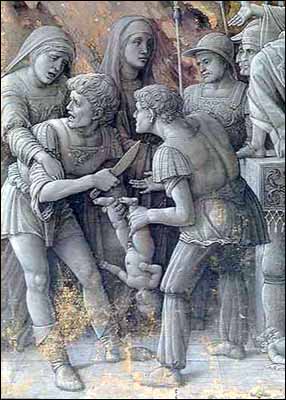 Detail from Andrea Mantegna, 'The Judgment of Solomon' (1495), engraving, 46x37 cm, Louvre Museum, Paris. Full image. |
Solomon does the unexpected. He orders that the living baby be cut in two, with half to be given to each claimant. It works only because the claimants believe that Solomon will actually follow through with his threat. This gives us some idea of the brutal power of monarchs of the time.60
The true mother becomes clear; she is the one willing to give her child to the deceitful mother in order to preserve the baby's life. When this decision becomes known, it cements Solomon's reputation among his people as a wise king.
"When all Israel heard the verdict61 the king had given, they held the king in awe, because they saw that he had wisdom from God to administer justice." (1 Kings 3:28)
Solomon's Support of True Justice (Deuteronomy 16:18-20)
Solomon presides over the two-level system of justice outlined in the Torah.
- Local courts are established in each town, and
- A central court in the capital is for harder cases, where a citizen had a right to be heard before the king himself (Deuteronomy 17:8-13).
There is to be equal justice for all, not just for the rich and powerful, but also for the poor and low-born. Deuteronomy specifies:
"18 Appoint judges and officials for each of your tribes in every town the Lord your God is giving you, and they shall judge the people fairly.62 19 Do not pervert justice or show partiality. Do not accept a bribe, for a bribe blinds the eyes of the wise and twists the words of the righteous. 20 Follow justice and justice alone, so that you may live and possess the land the Lord your God is giving you." (Deuteronomy 16:18--20)
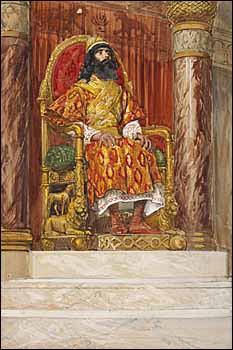 James J. Tissot, 'Solomon Is Made King' (1896-1904), gouache on board, Jewish Museum, New York. Larger image. |
"Justice" in verse 20 is ṣedeq, "justice, righteousness," from ṣādēq, "to be just, righteous." This root basically connotes conformity to an ethical or moral standard.63 At the beginning of verse 20, the word is doubled in Hebrew which brings special emphasis, as expressed in the KJV: "That which is altogether just..."
Notice the prohibition against bribery. Judges must not succumb to self-serving behavior, but insist on even-handed justice. There is also particular concern for the powerless, whether or not he is native-born.
"Do not deprive the alien[64] or the fatherless of justice, or take the cloak of the widow as a pledge." (Deuteronomy 24:17)
We live in a time of nearly unprecedented immigration due to wars, oppression, famine, lack of economic opportunity, etc. This is true literally all over the world -- in Europe, Africa, Asia, and the Americas. Deuteronomy reminds its Jewish readers to remember their own history as discriminated people in Egypt.
"17 For the Lord your God is God of gods and Lord of lords, the great God, mighty and awesome, who shows no partiality and accepts no bribes. 18 He defends the cause of the fatherless and the widow, and loves the alien, giving him food and clothing. 19 And you are to love those who are aliens, for you yourselves were aliens in Egypt." (Deuteronomy 10:17--19; cf. 24:22)
We are required to love the very aliens that some in our society demonize.
Justice in the Proverbs
Solomon is deeply involved in collecting and curating proverbs (1 Kings 4:32). Throughout the Book of Proverbs, you see themes of the dangers of partiality and bribes. Each of the following is attributed to Solomon and reflects his values.
"A wicked man accepts a bribe in secret
to pervert the course of justice." (Proverbs 17:23)
"It is not good to be partial to the wicked
or to deprive the innocent of justice." (Proverbs 18:5)
"When a king
sits on his throne to judge,
he winnows out all evil with his eyes." (Proverbs 20:8)
"When justice is done, it brings joy to the
righteous
but terror to evildoers." (Proverbs 21:15)
"By justice a king gives a country stability,
but one who is greedy for bribes tears it down." (Proverbs 29:4)
"The righteous care about justice for the
poor,
but the wicked have no such concern." (Proverbs 29:7)
"If a king judges the poor with fairness,
his throne will always be secure." (Proverbs 29:14)
Justice in Psalm 72
In Psalm 72, also attributed to Solomon, we see a prayer for royal justice and righteousness.
"1 Endow the king with your
justice, O God,
the royal son with your righteousness.
2 He will judge your people in righteousness,
your afflicted ones with justice...
4 He will defend the afflicted among the people
and save the children of the needy;
he will crush the oppressor." (Psalm 72:1-2, 4)
Solomon is a just king who promotes justice throughout the land. He also cares about his responsibility to the poor, for later in Psalm 72 he says of the king:
"12 He will deliver the needy who
cry out,
the afflicted who have no one to help.
13 He will take pity on the weak and the needy
and save the needy from death.
14 He will rescue them from oppression and violence,
for precious is their blood in his sight." (Psalm 72:12--14)
Messiah's Justice (Isaiah 9 and 11)
Jesus Christ, Solomon's descendant, is also known for his absolute fairness in executing justice. Isaiah prophesies of the Messiah:
"He will reign on David's throne
and over his kingdom,
establishing and upholding it
with justice and righteousness
from that time on and forever." (Isaiah 9:7)
"3b He will not judge by what he
sees with his eyes,
or decide by what he hears with his ears;
4 but
with righteousness he will judge the needy,
with justice he will give decisions for the poor of the earth.
He will strike the earth with the rod of his mouth;
with the breath of his lips he will slay the wicked.
5 Righteousness will be his belt
and faithfulness the sash around his waist." (Isaiah 11:3b-5)
 Statue of blindfolded Lady Justice at the Old Civic Registry, Bruges, Belgium. |
It is no accident that statues of Lady Justice in front of western courthouses are often blindfolded, emphasizing lack of bias or impartiality. Sometimes, we are angry at our court system for not giving us the result we desire. Rather, we need to encourage the independent, even-handed administration of true justice by our courts.
Q7. (1 Kings 3:16-28) Why does the Scripture emphasize
justice for the poor and disadvantaged, the alien and the orphan? Why are
courts often inclined to favor the wealthy? Why do societies throughout the
ages tend to perpetuate discrimination against outsiders? In what ways should
social justice be a value for followers of Yahweh and of Jesus in our day?
https://www.joyfulheart.com/forums/topic/2250-q7-justice/
2.5 Solomon's Administrative Wisdom (1 Kings 4)
Immediately following an example of Solomon's judicial wisdom, we are told of Solomon's cabinet of officers, implying that Solomon's wisdom is evident in structuring and administering his kingdom.65
Twelve Tax Districts (1 Kings 4:7-19)
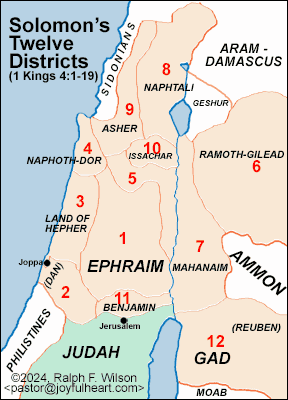 Solomon's 12 Administrative Districts (larger map) |
Prior to Solomon's reign, the structure of the 12 tribes had been used to govern Israel. Now, Solomon institutes an administration of 12 districts that don't always correspond to the previous tribal boundaries.
"Solomon also had twelve district governors over all Israel, who supplied provisions for the king and the royal household. Each one had to provide supplies for one month in the year." (1 Kings 4:7).
The responsibility of these tax districts is great, since Solomon's needs are vast. The writer of Kings details them. Note: a "cor" or "homer" is a dry measure of about 394 liters or 11 bushels.
"22 Solomon's daily provisions were thirty cors66 of fine flour and sixty cors of meal, 23 ten head of stall-fed cattle, twenty of pasture-fed cattle and a hundred sheep and goats, as well as deer, gazelles, roebucks and choice fowl." (1 Kings 4:22-23)
That is for only one day! The king's huge family, harem, servants, multitude of officers at various levels, army, and workers must be fed.
"27 The district officers, each in his month, supplied provisions for King Solomon and all who came to the king's table. They saw to it that nothing was lacking. 28 They also brought to the proper place their quotas of barley and straw for the chariot horses and the other horses."67 (1 Kings 4:27-28)
These 12 districts are essentially tax districts designed to provide for the growing expenses of the king's household and bureaucracy. As we'll see, they generated a good bit of resentment. If you look carefully at 1 Kings 4:7-19, you'll observe several things:
1. Taxation. Taxation is taken very seriously during Solomon's reign. Taxation is necessary to support the increasing size of the royal bureaucracy, as well as the king's ambitious building projects and fortified military garrisons scattered strategically throughout the land.
2. Tribal Division. In only half of the cases, the districts conform to the traditional tribal boundaries. In the other districts, this probably had the effect of increasing the king's influence and decreasing the influence of the ancient tribes.68
3. Favoritism. According to the Hebrew text, the tribe of Judah, the largest and Solomon's own tribe, is not included among these 12 districts. However, according the Greek Septuagint translation of 1 Kings 4:19,69 Judah may have had one officer.
Think of how divisive this must have been! It helps explain the division of the united kingdom into northern (Israel) and southern (Judah) kingdoms after Solomon's death (Lesson 6.4).
Peace and Prosperity (1 Kings 4:20, 25)
 'Vine and Fig Tree' (1907), needlework in linen on chair back, Deerfield Society of Blue and white Needlework. Memorial Hall Museum, Deerfield, Massachusetts. Larger image. |
In spite of taxation, the writer of Kings paints a rosy picture of life under Solomon's rule. Indeed, in the absence of war on their soil, with relative peace in the region, and a well-administered kingdom, life is good.
"The people of Judah and Israel were as numerous as the sand on the seashore; they ate, they drank and they were happy." (1 Kings 4:20)
"During Solomon's lifetime Judah and Israel, from Dan to Beersheba, lived in safety, each man under his own vine and fig tree." (1 Kings 4:25)
Notice the stock Hebraic phrases that indicate prosperity and wholeness:
"As numerous as the sand on the seashore" is hyperbole, of course, but it is a common phrase used to express a very great number.70
"Each man under his own vine and fig tree" is an expression of the richness of the land, peace, and prosperity to all the people (Deuteronomy 8:7-10).71 It reminds me of an American political slogan of the 1920s, "a chicken in every pot."72
"From Dan to Beersheba" is a way of describing all the people of the Promised Land, extending from Dan north of the Sea of Galilee to Beersheba, a desert oasis in the south.73
Overall, the citizens of Solomon's kingdom enjoyed both peace and prosperity, since their kingdom was preeminent in the region. That doesn't mean there was no dissention, however, which we'll review in Lesson 6.2 and Lesson 6.4.
Suzerainty over Neighboring Countries (1 Kings 4:21)
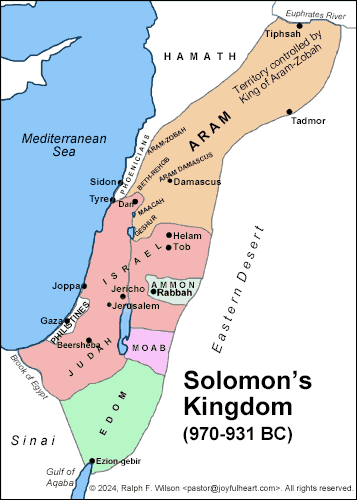 Solomon's Kingdom (970-931 BC) (larger map). Shows Dan and Beersheba, traditional north and south cities of Israel. |
With a few exceptions, Solomon is able to exert control over all the lands that David had brought into subjection, each with its annual tribute.
"And Solomon ruled over all the kingdoms from the River to the land of the Philistines, as far as the border of Egypt. These countries brought tribute and were Solomon's subjects all his life." (1 Kings 4:21)
"He ruled over all the kingdoms west of the River, from Tiphsah74 to Gaza, and had peace on all sides." (1 Kings 4:24)
Solomon's ability to accomplish this during his lifetime implies great wisdom. Maintaining such a vast empire is possible for Solomon during this period because, as we have seen in the Introduction, the great powers of Egypt and Mesopotamian kingdoms were either preoccupied with internal problems or, in the case of Phoenicia, vassals and Solomon's partners in his building and trading ventures (Lesson 5.3).
Maintaining the empire that David built had both advantages and disadvantages.
- Tribute. The conquered states pay regular tribute to Solomon that helps finance his kingdom's development. (See Lesson 5.5.)
- Tariffs. Because of such control, Solomon is able to levy taxes on all goods that pass through the territories under his control, bringing in vast revenue. (See Lesson 5.5.)
- Occupation. Control requires fortified garrisons and chariot cities strategically placed to protect Israel and Judah from attack, as well as garrisons in other countries to maintain control. (See Lesson 5.2.) This is expensive!
We are told, "Solomon had four thousand stalls for chariot horses, and twelve thousand horses" (1 Kings 4:26). While chariots are not effective war machines in the mountains of Samaria and Judah, they help Solomon control the coastal plains and valleys where the chariot represents the height of military technology and effectiveness. (More on this in Lesson 5.5.)
Unmatched Wisdom (1 Kings 4:29-31, 34)
Solomon is known far and wide for his wisdom.
"29 God gave Solomon wisdom and very great insight, and a breadth of understanding as measureless as the sand on the seashore. 30 Solomon's wisdom was greater than the wisdom of all the men of the East, and greater than all the wisdom of Egypt. 31 He was wiser than any other man, including Ethan the Ezrahite75-- wiser than Heman,76 Calcol and Darda, the sons of Mahol. And his fame spread to all the surrounding nations." (1 Kings 4:29-31).
People from all over come to learn from him. Kings send their smartest scholars and leaders to learn from him.
"Men of all nations came to listen to Solomon's wisdom, sent by all the kings of the world, who had heard of his wisdom." (1 Kings 4:34)
Most famous of these famous people who visit Solomon is the Queen of Sheba, whose visit we'll discuss in Lesson 5.4.
2.6 Solomon's Proverbs, Songs, and Writings (1 Kings 4:32-33)
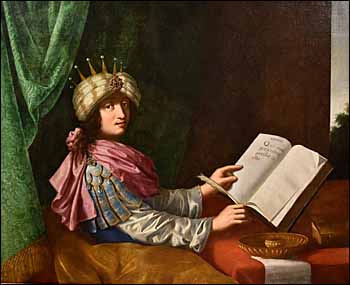 Michele Desubleo (1602-1676), 'Portrait of King Solomon' (17th century), oil on canvas, 64x53 in., auctioned. |
Solomon is a prolific writer and poet. 77
"He spoke three thousand proverbs and his songs numbered a thousand and five." (1 Kings 4:32)
Let's examine Solomon's possible contributions to the Book of Proverbs, Ecclesiastes, and the Song of Solomon. All these are the type of literature known as Wisdom Literature, found in the Hebrew Bible among the "Writings."
Solomon's Love of Natural History
Before we look into his writings, however, verse 33 tells us that Solomon is a natural historian, extremely interested in the fauna and flora of his kingdom.
"He described plant life, from the cedar of Lebanon to the hyssop that grows out of walls. He also taught about animals and birds, reptiles and fish." (1 Kings 4:33)
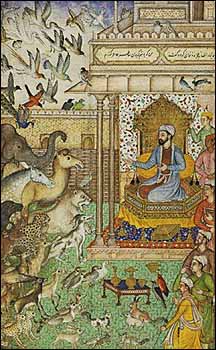 'King Solomon and the animals' (1595, India), Mughal miniature, in Light of Canopus (Anvar-i suhayli), a compilation of fables and stories with a long tradition in the Islamic world. Larger image. |
As we saw in Section 2.1 above, the primary synonyms for "wisdom" take in a wide spectrum of knowledge. Solomon is a botanist, as well as a zoologist. Like other great Near Eastern monarchs, Solomon probably has both zoological and botanical gardens near the palace where he spends time in observation and in entertaining his guests. When others express an interest in his plants and animals, he teaches them what he has learned through observation.
Proverbs of Solomon (Psalm 4:32a)
The Book of Proverbs is a compendium of wisdom sayings. It begins with the assertion:
"1 The proverbs of Solomon son of
David, king of Israel:
2 for attaining wisdom and discipline;
for understanding words of insight,
3 for acquiring a disciplined and prudent life,
doing what is right and just and fair..." (Proverbs 1:1-3)
Solomon isn't the originator of the proverb, a pithy saying as a way of capsulizing wisdom. However, he is a collector and curator of existing proverbs and the author of many.
"He spoke three thousand proverbs...." (1 Kings 4:32a)
Within the Book of Proverbs are two sections attributed to Solomon himself:
Chapters 10:1 to 22:16, and
Chapters 25 to 29
Generation after generation of Jewish children -- and later, Christian children -- have been drilled in basic values and wise behavior by reading and memorizing the Proverbs under the tutelage of their parents and teachers. Many of these proverbs are familiar to believers.
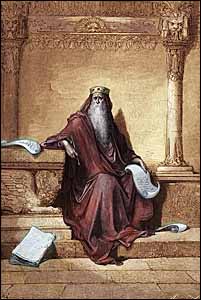 Gustave Doré, 'King Solomon Writing the Proverbs' (1886), colorized, wood engraving, in La Grande Bible de Tours, illustrating 2 Chronicles 1:10. |
"My son, do not forget my teaching,
but keep my commands in your heart,
for they will prolong your life many years
and bring you prosperity." (Proverbs 3:1--2)
"Trust in the Lord
with all your heart
and lean not on your own understanding;
in all your ways acknowledge him,
and he will make your paths straight." (Proverbs 3:5--6)
"Train a child in the way he should go,
and when he is old he will not turn from it." (Proverbs 22:6)
And many, many more. Solomon's wisdom continues to influence us nearly three millennia after his death.
The Book of Ecclesiastes
The Book of Ecclesiastes is another book designed to teach wisdom.
Solomon's authorship has been questioned in recent years,78 but I see Solomon's hand at work here. As the book begins, a narrator explains to us that he is reporting the words of the Teacher [or Preacher],79 who "pondered and searched out and set in order many proverbs" (Ecclesiastes 12:9b). It is clear that Solomon is in mind. Eaton explains:
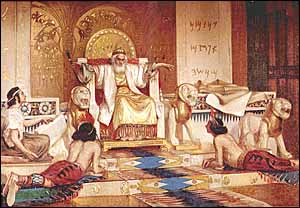 Isaak Asknaziy, ' Ecclesiastes' (1900), illustration in Russian language Jewish Encyclopedia (Brockhaus and Efron, 1906 -- 1913). Larger image. |
"The hypothesis (and it can be no more than that) ... is that an editor is presenting in his own words and style the teaching of a revered wise man."80
The actual date of composition is difficult to determine. The book begins with a cry of despair and portrays a deep cynicism throughout.
"The words of the Preacher, the son of David,
king in Jerusalem.
Vanity of vanities, says the Preacher,
vanity of vanities! All is vanity." (Ecclesiastes 1:1--2, ESV)
The Preacher has tried out all sorts of human endeavors and found them empty. The word translated "vanity" (ESV, NRSV, KJV), "meaningless" (NIV), "sheer futility" (NJB) is hebel, "vapor, breath, vanity."81 The Preacher has explored wisdom and finds it "a chasing after wind" (Ecclesiastes 1:12-17). Pleasures, building projects, harems full of concubines, and gathering wealth are meaningless also (2:1-11). So is the pursuit of wisdom (2:12-16) and endless human toil (2:17-23).
The author concludes:
"24 A man can do nothing better than to eat and drink and find satisfaction in his work. This too, I see, is from the hand of God, 25 for without him, who can eat or find enjoyment? 26 To the man who pleases him, God gives wisdom, knowledge and happiness, but to the sinner he gives the task of gathering and storing up wealth to hand it over to the one who pleases God. This too is meaningless, a chasing after the wind." (Ecclesiastes 2:24--26)
"13 Now all has been heard;
here is the conclusion of the matter:
Fear God and keep his commandments,
for this is the whole duty of man.
14 For God will bring every deed into judgment,
including every hidden thing,
whether it is good or evil." (Ecclesiastes 12:13-14)
Solomon concludes that nothing has lasting meaning apart from God.
Solomon's Songs (1 Kings 4:32b)
Though we don't know for certain what songs he authored, Solomon is a clearly a literary and poetic king.
"His songs numbered a thousand and five." (1 Kings 4:32b)
Because of this, Solomon no doubt gathers writers, poets, and literary people around him, sparking a renaissance of wisdom and learning during his reign.
Two psalms or songs in the Book of Psalms are attributed to Solomon. The first is Psalm 72:
"Of Solomon.
Endow the king with your justice, O God,
the royal son with your righteousness.
He will judge your people in righteousness,
your afflicted ones with justice." (Psalm 72:1-2)
It recalls Solomon's dream and his request of God:
"Give your servant a discerning heart to
govern your people
and to distinguish between right and wrong." (1 Kings 3:9a)
The second of his psalms is Psalm 127, found among the Psalms of Ascent. It was sung by pilgrims as they traveled up the hills to worship in Jerusalem. It begins:
"Unless the Lord
builds the house,
its builders labor in vain.
Unless the Lord watches over the
city,
the watchmen stand guard in vain." (Psalm 127:1)
Solomon, who builds Yahweh's House under God's direction realizes his utter dependence upon God for this project.
Solomon's Song of Songs
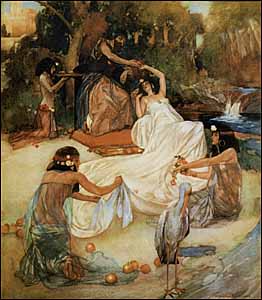 Sir William Russell Flint (Scottish artist and illustrator, 1880-1969), 'Song of Solomon,' lithograph plate from original watercolor and gouache, 14.6x12.4 in., illustration included in William Russell Flint, The Song of Songs which is Solomon's (Philip Lee Warner for the Medici Society, 1909), hardback. Larger image. |
A third song attributed to Solomon in the Bible is the "Song of Songs," "Song of Solomon," or "Canticles," an extended poem with eight chapters in our English Bibles. On the surface, it is a beautiful love song, portraying the joy, eroticism, and fears that accompany love and courtship. Some have seen in it a metaphor for the church's love for Christ.
We read that the female lover is dark like "the tent curtains of Solomon" (1:5). Later, Solomon himself appears in the poem, riding in a carriage escorted by a bodyguard of 60 warriors. Then the poet calls out:
+Come out, you daughters of Zion,
and look at King Solomon wearing the crown,
the crown with which his mother crowned him
on the day of his wedding,
the day his heart rejoiced." (3:11)
Finally, the poet mentions Solomon's vineyard at Baal Hamon. The female lover seems to be playing hard-to-get and responds.
"But my own vineyard is mine to give;
the thousand shekels are for you, O Solomon,
and two hundred are for those who tend its fruit." (8:12)
Is Solomon himself the male lover in the poem? Certainly, Solomon is a lover of women, but the identity of the lover isn't fully clear in the Song of Solomon.
Traditionally, the Song of Solomon has been attributed to Solomon, but modern scholars aren't so sure.82 I've wondered if this song is Solomon's exploration of what true love might be in the world outside his harem, love that is not self-serving.
While we don't know the extent to which Solomon's hand is on Proverbs, Ecclesiastes, and Song of Solomon, we know God's Spirit inspired their writing so that they are included in the Holy Scriptures. Solomon's interest in knowledge, literature, and song also made a powerful impact on scholarship in his own day and for centuries to come.
"5 Get wisdom, get understanding;
do not forget my words or swerve from them.
6 Do not forsake wisdom, and she
will protect you;
love her, and she will watch over you.
7 Wisdom is supreme; therefore get wisdom.
Though it cost all you have, get understanding.
8 Esteem her, and she will exalt you;
embrace her, and she will honor you." (Proverbs 4:5-8)
As Solomon calls believers to seek wisdom in his day, James reminds us to seek after wisdom today.
"If any of you lacks wisdom,
he should ask God,
who gives generously to all without finding fault,
and it will be given to him." (James 1:4--5)
Q8. How have the writings attributed to Solomon affected
your understanding, perspective, and way of life? In what ways? Which proverbs
have you committed to memory? Which of these is most dear to you?
https://www.joyfulheart.com/forums/topic/2251-q8-proverbs/
2.7 God's Gifting
"I will give you a wise and discerning heart, so that there will never have been anyone like you, nor will there ever be." (1 Kings 2:12)
What is it like for God to "give" wisdom to Solomon? Is he dumb or average before, and suddenly now bright and intelligent? As I've tried to understand the nature of spiritual gifts, I've come to the place that I don't think so.
"Natural" Talents and "Spiritual" Gifts
I see Solomon as a precocious child -- nerdy, bookish, intelligent -- long before he becomes king. He is "wired" by God from birth with what we would call "a gifted mind." When God grants him wisdom to govern wisely, it may be a kind of anointing that looses his innate gifts for God's task, setting free so-called natural talents so they now function at a spiritual level.
Moses feels inadequate to lead God's people, thinking that eloquence is necessary. But God promises to help him and tells him, "Now go; I will help you speak and will teach you what to say" (Exodus 4:12). Like Moses, God helps Solomon abundantly, beyond what he could ask or think (Ephesians 3:20).
Perhaps at the time of one of Solomon's two anointings (1 Kings 1:34; 1 Chronicles 29:22b), Solomon's gifts of wisdom are activated as he enters into his "ministry" as a monarch. Or maybe the breakthrough comes a bit later after Yahweh's appearance to him in Gibeon. Whenever it occurs, God equips him generously for the task.
Many people see spiritual gifts as separate from natural gifts. For the most part, I think this is a false distinction. All gifts, "natural" and "spiritual," are from God. As we begin to operate in ministry or in kingdom-building activities under the direction of the Lord, the spiritual anointing kicks in to flourish the gift(s) already built into our being by God. That doesn't mean, however, that God can't suddenly gift and call us to do something completely out of our norm. Because of His Holy Spirit within you, God can do anything through you at any time! See my study, Disciple's Guide to the Holy Spirit (JesusWalk, 2018).
The Parable of the Talents (Matthew 25:14-30)
Jesus tells a pair of similar parables that relate to gifting -- the Parable of the Talents (Matthew 25:14-30) and the Parable of the Pounds or Minas (Luke 19:11-27).
In the Parable of the Talents, a wealthy man going on a long journey diversifies his business. He gives money to various slaves, "each according to his ability." This reminds me of Solomon, who is exceptionally gifted, while others may be more average. It is God who decides how we are to be gifted and how he forms us to fit into the "body of Christ" (1 Corinthians 12:4-27).
In the parable, the wealthy man gives his money in talents -- each talent a sizeable fortune! Each slave is responsible to use the money entrusted to him to expand the master's wealth. When the master returns, the first two slaves (who are given 5 and 2 talents respectively) report to their master how they have doubled his initial investment. The master responds:
"Well done, good and faithful servant! You have been faithful with a few things; I will put you in charge of many things. Come and share your master's happiness!" (Matthew 25:21)
But a third slave despises the master and buries his one talent portion so he won't lose it, and then digs it up on his master's return and gives it back. The master is angry! He chastises the slave as a "wicked, lazy servant" (Matthew 25:26a).
"28 Take the talent from him and give it to the one who has the ten talents. 29 For everyone who has will be given more, and he will have an abundance. Whoever does not have, even what he has will be taken from him." (Matthew 25:28--29)83
Why should the servant who doubled his share from five to 10 talents get the wicked slave's talent? Because the master knows that he will use it!
Solomon is abundantly gifted! No doubt about it -- far more than you or I. But God has gifted you. What are you naturally good at? Your ability is from God, whatever it is. You may even be making a living for your family using this talent. Bravo! My question is this: Are you using your "natural" talents, your gifts, your abilities for God and for his work? I hope so! If you recognize certain "spiritual" gifts, how are you using them in the kingdom? God will hold you responsible for how you use (or don't use) what he has given you, and if you use them well, he will increase and refine your gift.
"From everyone who has been given much,
much will be demanded;
and from the one who has been entrusted with much,
much more will be asked." (Luke 12:48)
More on this as it relates to wealth in Lesson 5.6.
Q9. (1 Kings 2:12; Matthew 25:14-30) What "natural" talent(s)
do you have? What are you good at in the natural world? How are you using these
talents for God and his Kingdom? Have you identified any "spiritual" gifts? How
are you using those? Have you found that your "natural" talents are related to
your "spiritual" gifts? If so, describe how they relate to each other.
https://www.joyfulheart.com/forums/topic/2252-q9-talents/
Prayer
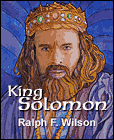 Available in book formats - PDF, Kindle, Paperback |
Father, you were generous and merciful to Solomon. I pray that you would help us discern and be thankful for all that you have given us, and use it deliberately and wisely all our lives. In Jesus' name, we pray. Amen.
Lessons for Disciples
God's gifts to Solomon of wisdom, riches, and honor have lots to teach us about how to understand how God has gifted us. Some of the lessons of 1 Kings 3 and 4 include:
- Solomon's lesser sins of intermarriage with foreign wives and worshiping on the high places, lead to the greater sin of apostasy when he is older (1 Kings 3:1-4).
- When Solomon sacrifices at Gibeon and God appears to him in a dream, he is a devout follower of Yahweh, loving God and loved by God, desiring to lead God's people with wisdom (1 Kings 3:6-9).
- Solomon's request for wisdom to govern God's people pleases God, because it is not selfish, but displays love and a desire to serve (1 Kings 3:6-9). It shows singleness of heart.
- God gives Solomon gifts he does not ask for. Most of the gifts we have received from God come unasked for (1 Kings 3:11-15a).
- "Wisdom" in Hebrew covers a broad scope of wise conduct, moral insight, intellect, skill, craftsmanship, battle tactics, governing, shrewdness, and prudence.
- In determining which of the women is the live child's mother, Solomon demonstrates judicial wisdom (1 Kings 3:16-28).
- Many of the proverbs indicate Solomon's convictions concerning impartial administration of justice.
- Psalm 72, attributed to Solomon, promotes helping the poor and disadvantaged (Psalm 72:1-4, 12-14).
- The structure of Solomon's cabinet and tax districts reveals administrative wisdom (1 Kings 4:1-19).
- Solomon's wisdom includes a focus on natural history, as well as writing proverbs, songs, and psalms. The Books of Proverbs, Ecclesiastes, and Song of Solomon reflect his literary interest (1 Kings 4:32-33).
- God's gifts to us include both natural abilities and spiritual power.
- Jesus teaches in the Parable of the Talents that we are responsible to use wisely what God has given us (Matthew 25:14-30; Luke 12:48).
Endnotes
[38] While intermarriage was not new in Israel, it was still condemned by the righteous. Intermarriage took place during the period of the Judges (Judges 3:5-6). While Elimelech and Naomi are in Moab during a famine, their sons both marry Moabite girls, though later Ruth converts to Yahweh (Ruth 1:4) Intermarriage is called out by Ezra after the exile (Ezra 9), though it continued in Nehemiah's time (Nehemiah 13:23-27).
[39] Judges 2:5; 6:24; 20:26; 21:2-4; 1 Samuel 6:15; 7:17; 9:12; 10:8; 16:1--5.
[40] Joash, the boy king (2 Kings 12:3), Amaziah (2 Kings 14:4); Azariah (2 Kings 15:4), Jotham (2 Kings 15:35).
[41] After the conquest under Joshua, Gibeon became a Levitical city in the territory of Benjamin atop a limestone outcropping. We get the idea that Gibeon is a sacred place from the phrase, "at Gibeon on the mountain of the Lord" (2 Samuel 21:6) (K. N. Schoville, "Gibeon," ISBE 2:462).
[42] Joshua 8:1; 1 Samuel 1:9.
[43] Psalm 78:60; Jeremiah 7:12-14; 26:6.
[44] 1 Chronicles 16:39; 21:29.
[45] Adrianus Van Selms, "Nob," ISBE 3:545.
[46] Wiseman (1&2 Kings, p. 84) says that "a thousand" can be used as a generalization that means "very many" (Deuteronomy 1:11). "The basic meaning is one thousand, but is often to be taken as a figurative term" (Jack B. Scott, ʾelep, TWOT #109a).
[47] "The key word in this sentence is "appeared," rāʾâ, "see," in the Niphal voice as here, "to be seen" or "to reveal oneself." Rāʾâ is employed far more than any other word for the act of an authentic prophet in receiving oracles from God" (Robert D. Culver, TWOT #2095).
[48] Hesed, "steadfast love" or "loving-kindness" (Wiseman, 1&2 Kings, p. 84).
[49] Literally, "how to go out and come in," which means, to possess leadership qualities or to manage business (Wiseman, 1&2 Kings, p. 85; Numbers 27:17; Deuteronomy 31:2; Psalm 121:8).
[50] "Discernment in administering justice" (NIV), "understanding to discern what is right" (ESV, NRSV), "understanding to discern judgment" (KJV) is three words, (1) the Hiphil infinitive construct of bîn, "to understand", the Qal infinitive construct of shāmaʿ, "to hear, listen to, obey," and (3) the noun mishpāṭ, "justice, governing" (TWOT #2443c).
[51] Since Solomon disobeys, he doesn't meet the condition of verse 14, and lived only about 60 years (1 Kings 11:42), rather than a long life of 70 or 80 years (Psalm 90:10).
[52] Shāpaṭ can be used in several ways: (1) to act as ruler, (2) to decide cases of controversy as judge, (3) execute judicial decisions, and (4) of God as the ultimate judge (Robert D. Culver, TWOT #2443). Related words are judgment (shepheṭ and shĕpōṭ), and justice, ordinance (mishpāṭ). The word shāpaṭ is used in the period of the Judges (those who "judged" the people) as well as the period of the Monarchy. "The primary sense of shāpaṭ is to exercise the processes of government. Since, however, the ancients did not always divide the functions of government, as most modern governments do, between legislative, executive, and judicial functions (and departments) the common translation, 'to judge,' misleads us. For, the word, judge, as shāpaṭ is usually translated in modern English, means to exercise only the judicial function of government."
[53] Louis Goldberg, ḥākām, TWOT #647.The noun ḥokmâ is "wisdom." The noun ḥākām is "a wise man." The root ḥākam and its derivatives constitute the most frequent word group in the Hebrew Old Testament denoting intelligence, occurring some 312 times. About three-fifths of the occurrences are found in Job, Proverbs, and Ecclesiastes.
[54] Wiseman, 1&2 Kings, p. 85.
[55] Louis Goldbert, ḥākām, TWOT #647. Goldberg explains, "The usages of ḥokmâ ("wisdom") cover the whole gamut of human experience. Wisdom is seen in the skill of technical work in making garments for the high priest (Exodus 28:3), craftsmanship in metal work (Exodus 31:3, 6), as well as the execution of battle tactics (Isaiah 10:13). Wisdom is required from government leaders and heads of state for administration (Deuteronomy 34:9; 2 Samuel 14:20), pagan leaders as well as Israelites (Ezekiel 28:4-5). The Messiah demonstrates wisdom and discernment in his function as leader of his people (Isaiah 11:2). Wisdom is also expressed in shrewdness. The woman of Tekoa averted a town's bloodshed in her clever plea for its safety (2 Samuel 20:22). Prudence, another aspect of wisdom, is expressed by those who speak with wisdom (Psalm 37:30; Proverbs 10:31), and who use time carefully (Psalm 90:12). This kind of wisdom in the practical affairs of life is derived from the revelation of God (Isaiah 33:6)."
[56] Louis Goldbert, bîn, TWOT #239. The related nouns are close synonyms to ḥokmâ ("wisdom"), and are used especially in Proverbs and Job. The verb and its derivatives are used 247 times. The background idea of the verb is to "discern," and this lies behind the derivative nouns and the close relation derived from the substantive bayin from which comes the preposition bên "between." bîn includes the concept of distinguishment that leads to understanding. The noun is bînâ, "understanding." Daniel had understanding of every subject which Nebuchadnezzar asked (Daniel 1:20). Bînâ can also refer to the very faculty of understanding. One is not to lean on his own understanding (Proverbs 3:5). People are encouraged diligently to seek this faculty of understanding (Proverbs 4:5, 7). Wisdom advises that a person should go in the way of understanding (Proverbs 9:6) and that the knowledge of the Holy One is understanding (Proverbs 9:10). Another related noun is tĕbûnâ, "understanding." Synonymous with bînâ, it is used in the same variety of ways, although in different passages. tĕbûnâ is also personified as a woman lifting up her voice (Proverb 8:1). Here understanding is parallel with wisdom and thus is seen as the teacher. In only one passage do bînâ and tĕbûnâ appear in synonymous parallelism: as one cries for discernment one must lift up his voice for understanding (Proverbs 2:3); the nouns refer to the object of knowledge. While understanding is a gift of God, it does not come automatically. The possession of it requires a persistent diligence.
[57] The Hebrew children surpassed others in knowledge (Daniel 1:4, 7). It is paralleled with that done in secret, hence "thought" (Ecclesiastes 10:20) (Jack P. Lewis, maddāʿ, TWOT #848g). The verb yāda can mean "understanding" in the sense of ability (e.g. Esau as a skillful hunter). It can also mean "to be perceptive," (Psalm 73:22). However, yādaʿ generally describes the process whereby one gains knowledge through experience with objects and circumstances. bîn is a power of judgment and perceptive insight and is demonstrated in the use of knowledge. In addition, the root śākal is widely used for ordinary intelligence and skill. It is often used for that wisdom which brings success -- even prosperity. This wisdom was possessed by David (1 Samuel 18:14) and will characterize the Messiah (Jeremiah 23:5; Isaiah 52:13) (R. Laird Harris, ḥākām, TWOT #647). In many instances śākal is synonymous with bîn. However, while bîn indicates "distinguishing between," śākal relates to an intelligent knowledge of the reason. The noun śēkel ("understanding, wisdom") refers to the display of prudence, or good sense. The noun also has the sense of insight or understanding. David prayed that the Lord would give his son Solomon wisdom (or discretion) concerning the affairs of Israel (I Chronicles 22:12) (Louis Goldberg, śākal, TWOT #2263).
[58] The Chronicler omits the story entirely.
[59] Wiseman (1&2 Kings, p. 88) notes that "prostitutes" could equally refer to inn-keepers, citing his own research in Tyndale Bulletin 14 (1964), pp. 8-11. That may have been true for Rahab in Jericho (Joshua 2:1), but two women who come before the king without their husbands, who have given birth recently and have been sleeping side-by-side are much more likely to be prostitutes.
[60] In our day, Solomon has been criticized by some scholars for threatening child mutilation, but those critics miss the point entirely.
[61] "Verdict" (NIV), "judgment" (ESV, NRSV, KJV) is mishpāṭ, "justice, ordinance," here, "a sentence or decision issuing from a magistrate's court" (Robert D. Culver, TWOT #2443c).
[62] The phrase "judge fairly" (NIV), "with righteous judgment" (ESV), "just decisions" (NRSV), "just judgment" (KJV) consists of two key words: the noun ṣedeq, "rightness" (TWOT #1879a) and the noun mishpāṭ, "justice" (TWOT #2443c).
[63] Harold G. Stigers, ṣedeq, TWOT #1879a.
[64] "Alien" (NIV), "sojourner" (ESV), "resident alien" (NRSV), "stranger" (KJV) is gēr, "alien, sojourner, stranger, referring to someone who did not enjoy the rights usually possessed by the resident" (Harold G. Stigers, TWOT #330).
[65] Some things about Solomon's cabinet to note: Nathan the prophet (who was loyal to Solomon) now has two sons who are in the cabinet -- one over district officers, the other as a priest and personal advisor to the king. Both Zadok (who was loyal to Solomon) and Abiathar (who wasn't) are listed as priests in the new administration. At some point, Abiathar is dismissed to his home village. The new head of the army is Benaiah (who was loyal to Solomon), in place of Joab (who was not). Previously, Benaiah had been in charge of the king's bodyguard; now he is promoted to commander of the army. Of course, this list of Solomon's chief officers or cabinet is probably an initial group. Since Solomon has a forty-year reign, the list would have changed over time.
[66] The exact amounts evade us ("Homer," ISBE 2:749; E. M. Cook, "Weights and Measures," ISBE 4:1050; Ezekiel 45:11, 14).
[67] "Other horses" (NIV), "swift steeds" (ESV, NRSV), "dromedaries" (KJV) is rekesh, "steeds" (TWOT #2167a), "teams of horses" or "post-horses" (Esther 8:10, 14; Holladay, p. 340); According to Wiseman (1&2 Kings, p. 95) they refer to "those 'bound' and trained by running alongside other either in chariot-teams or a spares."
[68] Bright, History, p. 221. Wiseman (1&2 Kings, p. 88) notes, "Solomon's inclusion of an official in charge of new districts which broke across traditional tribal areas and of one person in charge of forced labor led to a reorganization which sowed the seed for the rupture between the Northern Kingdom and Judah which was to follow."
[69] LXX 1 Kings 4:19: "Gaber son of Adai in the land of Gad, [the land] of Sihon king of Heshbon, and of Og king of Bashan, and one officer in the land of Judah." However, Judah, by far the largest tribe of all, would then still have been required to deliver the same amount as the smaller districts.
[70] Genesis 13:16; 15:5; 22:17; 2 Samuel 17:11.
[71] 1 Kings 18:31; Micah 4:4; Zechariah 3:10.
[72] The phrase is first used by Henry IV of France (1553-1610). In the 1928 Presidential campaign, a local committee issued ads for Herbert Hoover promising wages, dividends, progress and prosperity, with the headline, "A Chicken for Every Pot." After the depression hit in 1932, the opposing party sought to embarrass him by recalling this statement, though Hoover didn't actually say it himself (Rebuttal article, New York Times, 30 Oct 1932; Wiktionary article, "A chicken in every pot").
[73] Judges 20:1; 1 Samuel 3:20; 2 Samuel 3:10; 17:11; 24:2, 15; 2 Chronicles 30:5.
[74] Tiphsah is a town of northern Syria located on the west bank of the Euphrates River, a traditional place of crossing at its great western bend (K. E. Corley, "Tiphsah," ISBE 4:858). It was flooded by Lake Assad in 1974 when the Tabqa Dam was built.
[75] Psalm 89 is attributed to Ethan the Ezrahite, a wise man when Kings was being edited during the Exile.
[76] Heman's family may be leaders of temple singing (1 Chronicles 15:17; 2 Chronicles 5:12). In David's time there is a family of singers, the offspring of "Heman, the king's seer" (1 Chronicles 25:5; 2 Chronicles 35:15). The Heman mentioned here is called a "son of Mahol" ("Heman," ISBE 2:683).
[77] Through the Middle Ages, many pseudepigraphical works have been attributed to Solomon, some in the category of a grimoire or book of spells, a textbook of magic, typically including instructions on how to create magical objects like talismans and amulets, how to perform magical spells, charms, and divination, and how to summon or invoke supernatural entities such as angels, spirits, deities, and demons (Wikipedia article, "Grimoire"). One of the better known is the "Key of Solomon" that dates to 14th to 15th century Italy, influenced by earlier works of Jewish theosophical kabbala and Muslim magical sources (Wikipedia article, "Key of Solomon"). Of course, none of these date from anywhere near Solomon's time. So far as we can see from the Biblical texts, Solomon had no interest in magic. However, he did have some interest in foreign gods, as we'll see in Lesson 6.1.
[78] Recently, many scholars, including evangelical scholars, have questioned Solomonic authorship, partly because of the mention of "all who were over Jerusalem before me" (Ecclesiastes 1:12). Some conclude that perhaps the author is "some other actual or composite or ideal king of the dynasty of David." The book may have been edited later. As presently composed, it may be dated in the late 5th or early 4th century based on comparing Hebrew and Aramaic forms (W. J. Beecher and C. E. Armerding, "Ecclesiastes," ISBE 2:11 14). Enns says, "Ecclesiastes does not claim to be authored by Solomon, and the non-Solomonic authorship of Ecclesiastes is the least problematic position" (P. Enns, "Ecclesiastes 1: Book of," DOT:WPW, p. 123.
[79] "Preacher" (ESV, KJV), "teacher" (NIV, NRSV) is qōhelet, "preacher, speaker in assemblies," from the verb qāhal, "assemble" (Jack P. Lewis, qōhelet, TWOT #1991c).
[80] Michael A. Eaton, Ecclesiastes: An Introduction and Commentary (InterVarsity Press, 1983), p. 22.
[81] The basic meaning is "wind" or "breath," used in parallel with rûaḥ ("wind") in Isaiah 57:13. The word is used 36 times in Ecclesiastes, in the senses of "vanity, "senseless," and "empty" or "vacuous." (Victor P. Hamilton, TWOT #363a).
[82] "However, "Song of Songs exhibits some features that appear to be early and others that appear to be late," the work of copyists (G. Schwab, "Song of Songs 1: Book of," DOT:WPW, p. 739. Some scholars believe that "the collecting and editing of the songs culminated in wisdom circles, which attributed the book to the patron of wisdom of Solomon" (F. B. Knutson, "Canticles," ISBE 1:608).
[83] You can find a detailed exposition of the Parable of the Talents in my study, Jesus' Parables for Disciples (JesusWalk, 2023), Lesson 12.2 (www.jesuswalk.com/parables/11-practices.htm#Talents).
Copyright © 2025, Ralph F. Wilson. <pastor![]() joyfulheart.com> All rights reserved. A single copy of this article is free. Do not put this on a website. See legal, copyright, and reprint information.
joyfulheart.com> All rights reserved. A single copy of this article is free. Do not put this on a website. See legal, copyright, and reprint information.

